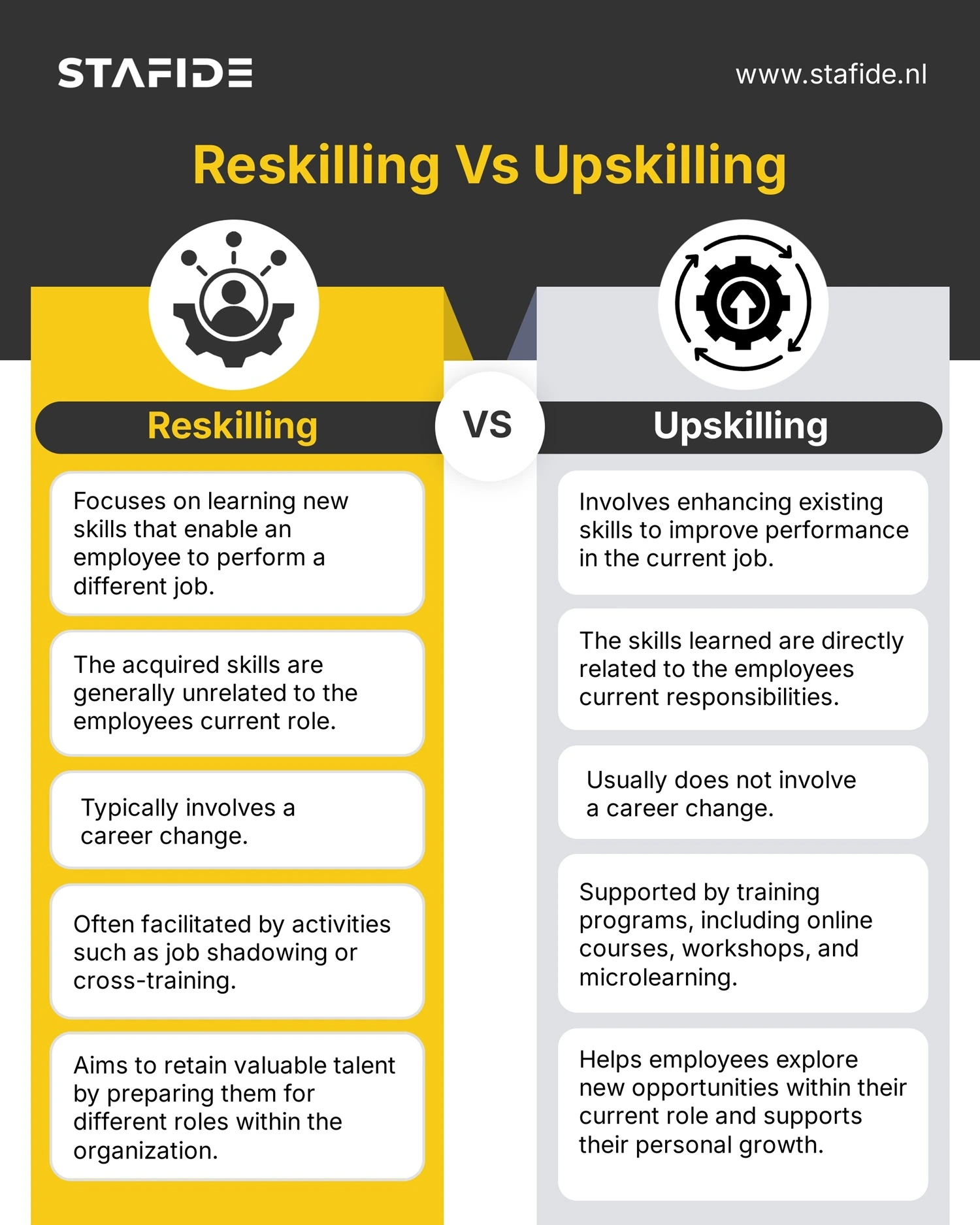We are in an era of rapid technological advancements and changing industry landscapes. As a result, the concept of a stable, lifelong career has shifted. Today’s job market is characterized by constant evolution. This evolution is driven by innovations in automation, artificial intelligence (AI), and globalization. To stay relevant and competitive, professionals must continuously adapt to new demands and opportunities. Upskilling and reskilling play a crucial role here.
Understanding Upskilling and Reskilling
Upskilling refers to the process of learning new skills and enhancing existing ones to better perform in your current role. It’s about deepening your expertise or broadening your capabilities within your industry.
For example, a digital marketer might upskill by learning advanced data analytics to improve campaign performance.
Reskilling, on the other hand, involves learning entirely new skills to transition to a different role or industry. This is often necessary when a job becomes obsolete due to technological advancements or shifts in market demand.
For instance, a manufacturing worker might reskill to become a software developer as automation reduces the need for manual labor.
Reskilling vs. Upskilling
Reskilling:
- Focuses on learning new skills that enable an employee to perform a different job.
- The acquired skills are generally unrelated to the employee’s current role.
- Typically involves a career change.
- Often facilitated by activities such as job shadowing or cross-training.
- Aims to retain valuable talent by preparing them for different roles within the organization.
Upskilling:
- Involves enhancing existing skills to improve performance in the current job.
- The skills learned are directly related to the employee’s current responsibilities.
- Usually does not involve a change in career.
- Supported by training programs, including online courses, workshops, and microlearning.
- Helps employees explore new opportunities within their current role and supports their personal growth.

Why Upskilling and Reskilling Are Essential
In a rapidly changing job market, upskilling and reskilling are crucial for both employees and organizations. Here’s why these strategies are widely used:
- Adapting to Technological Change: As technology evolves, employees must enhance their skills (upskilling) or learn new ones (reskilling) to stay relevant and effective in their roles.
- Closing Skill Gaps: Upskilling helps employees fill gaps in their current abilities, while reskilling prepares them for different roles, ensuring they can meet new demands.
- Boosting Retention: Companies that invest in employee development through upskilling and reskilling see higher job satisfaction and retention, as employees feel valued and see growth opportunities.
- Preparing for Industry Disruption: Both strategies help employees and organizations stay agile, allowing them to adapt quickly to changes in the industry or market conditions.
- Supporting Career Growth: Upskilling leads to advancement within a current field, while reskilling opens up new career opportunities, empowering employees to shape their futures.
- Enhancing Competitiveness: A well-trained workforce drives innovation and efficiency, giving organizations a competitive edge in the market.
- Facilitating Change: In times of organizational change, upskilling and reskilling ensure that employees are ready to take on new challenges and help the business succeed.
AI’s Influence on Upskilling and Reskilling
Artificial intelligence (AI) is rapidly transforming industries by automating tasks, enhancing efficiency, and creating entirely new job categories. This shift means that professionals must continually update their skills to remain competitive. Upskilling in AI-related areas—such as automation, machine learning, and data analysis—helps individuals not only work alongside AI but also harness its potential to improve job performance.
For those whose jobs may be impacted by AI, reskilling offers a pathway to transition into emerging fields. For example, a traditional administrative worker could reskill to manage AI-driven tools that streamline business operations.
AI’s rise is reshaping the job market, and mastering AI-related skills will be critical for both personal career growth and organizational success.
Key Strategies for Upskilling and Reskilling
- Identify Skill Gaps: Start by conducting a skills audit to pinpoint the specific areas where development is needed. This ensures that upskilling and reskilling efforts are focused and relevant.
- Leverage Online Learning Platforms: Utilize platforms like Coursera, Udemy, and LinkedIn Learning for flexible, on-demand training that can be tailored to individual needs and schedules.
- Promote a Culture of Continuous Learning: Foster an environment where ongoing education is encouraged and supported. Regular workshops, webinars, and access to learning resources can help keep skills current.
- Encourage Cross-Functional Training: Provide opportunities for employees to engage in cross-functional projects or job rotations, helping them to gain new skills and perspectives that are valuable across different roles.
- Implement Mentorship Programs: Pair employees with mentors who can guide their development, offering insights and advice that are crucial for successful upskilling or reskilling.
Benefits of Upskilling and Reskilling
Upskilling and reskilling are crucial for individuals as they boost employability, enhance career growth, and increase job security by keeping skills relevant in a changing job market. These practices also improve productivity and job satisfaction, leading to better employee retention.
For organizations, investing in upskilling and reskilling creates a more adaptable and innovative workforce. This approach ensures a competitive edge for businesses. Additionally, it offers cost savings by developing existing talent and aligns skills with future business needs.
Conclusion
Technological advancements like artificial intelligence and industry landscapes are constantly shifting. In this dynamic environment, upskilling and reskilling have become essential strategies. These strategies are crucial for both individuals and organizations. By proactively enhancing and acquiring new skills, professionals can stay relevant, competitive, and prepared for the future.
Businesses must invest in workforce development. It ensures they remain agile and innovative. This investment also prepares them to tackle any challenges that arise. As the job market continues to evolve, the importance of continuous learning and adaptation cannot be overstated.
At Stafide, we understand the critical role that upskilling and reskilling play in preparing for the future job market. Our team of experts specializes in introducing niche tech roles that align with the latest industry trends.
If your organization is looking to strengthen its workforce with top talent or if you’re a professional seeking the next step in your career, Stafide is here to help. Reach out to us and learn how we can support your growth and success in the ever-changing tech landscape.





